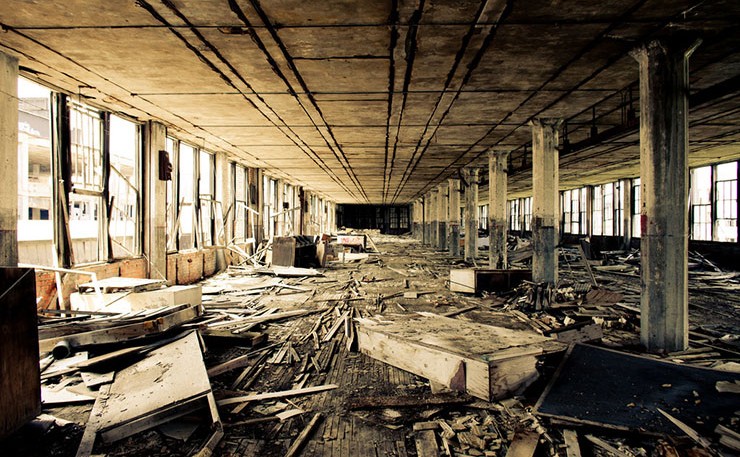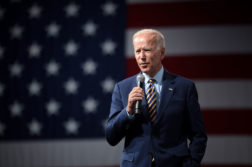One of the United States’ poorer cities is undergoing a renaissance. But not everyone has access to it, writes Dr Richard Hil.
One of Heidegger’s more memorable musings is that “the fracture renders the familiar explicit”. The thing about Detroit, USA which I recently visited, is you don’t have to look very far to come across enormous fractures in its socio-economic landscape. They’re everywhere, and they speak volumes about the dark neoliberal moment of American capitalism.
In Detroit, ruptures are part of everyday conversation. How could they not be? The devastation is all around; vast swathes of the city resemble a war zone. Indeed, I was told by a real estate agent that visitors to the city often ask, in all seriousness, if there has been a military conflict here. It’s hardly surprising. Countless houses lie in ruins, many boarded up or burnt out. There are empty lots where houses once stood, and acres of re-wilded fields, with factories and office blocks long gone.
Urban blight is the most commonly used description of such places. There’s a ghostly, eerie feel to all this: communities upended, lives disrupted, histories over-ridden by the ravages of economic decline. These days Detroit faces new challenges as it seeks some kind of existential renewal. It’s trying to reinvent itself as a happening place. And there’s some truth to this.
The city’s growing reputation as a magnet for capital investment and affordable housing, is attracting droves of speculators and bargain hunters. Young artists and entrepreneurs have set up shop in gentrified enclaves like Corktown in the middle of what is now known as “greater downtown”. House prices are on the rise and rents have sky rocketed in such places.
There’s even a new $185 million light rail – “Q-line” – that connects downtown to the city’s inner north. Along the way through the cultural precincts to the gigantic Ford hospital and Tamla Motown museum, new plate-glassed buildings glisten in the sun. There are slick cafes and new delis aplenty along this stretch that includes echoes of Detroit’s glorious architectural past in the gothic looking churches and ornate municipal buildings.
This is capital flow central, the epicentre of Detroit’s urban renewal and commercial renaissance.
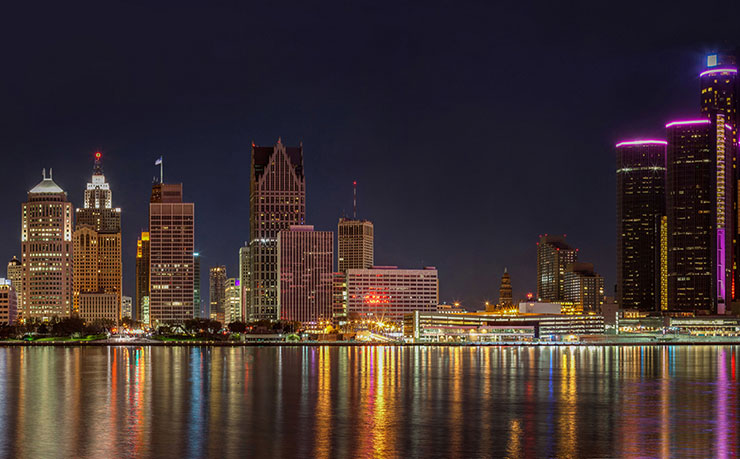
Town planners have been busy cultivating the city’s image as edgy, cool: a great place for cashed-up, mostly white hipsters to bed down. The inner-city gardens, murals and food venders suggest some sort of unique revival. The truth is however, that these initiatives and their aesthetic appeal have been appropriated from other, poorer parts of Detroit. African-Americans in the more distant suburbs have been creating ‘street art’ and edible gardens way before the recent marketing hullabaloo. Pulling in the new crowd of investors, it seems, requires cultural plunder instigated, it should be said, by ‘professionals’ who live well outside the city.
Beyond this refurbished zone of greater downtown is another world entirely: one of enduring poverty, misery and hardship. Over a third of the city’s residents live on, or below, the poverty line, and in many cases, this is deep poverty where malnutrition and serious illness lurks on a daily basis. They have precious little in common with the business people, politicians and self-proclaimed experts who are shaping the future of Detroit city.
Predictably, its African-Americans and Latinos who bear the brunt of economic hardship and marginalisation. It’s they who are still losing their homes, this time because of property tax related foreclosures. It’s they who make up the massed ranks of the city’s unemployed; over a third of the city’s residents are jobless. It’s perhaps not surprising that African-American organisations talk about “two Detroits”: the black/brown and the white. The average income of inner city dwellers is around $85,000 while in the poorer areas it hovers at around $25,000.
Many impoverished people wonder about the millions spent on the Q-line when those in outlying areas are forced to travel in old, beaten-up buses because they can’t afford a car.
They’ve every right to scratch their heads about the government’s priorities. While in 2008 car companies were bailed out to the tune of billions, ordinary folk in Detroit and across America lost their jobs and homes. There was no bail out for them. Many committed suicide, and others fled cities through force of necessity. And while the CEOs got richer, the poor got a whole lot poorer. Today, for these people, the wonders of urban renewal are passing them by.
Meanwhile, President Trump is about to make things worse for the poor, care of the proposed 2018 federal budget, recklessly slashing funds to programs that provide services and support to the neediest. As Trump plays call-my-bluff with North Korea, the elderly and many people with disabilities face cuts to meals-on-wheels services, this in the context of $54 billion handed to the US military to further advance the interests of those behind the war economy.
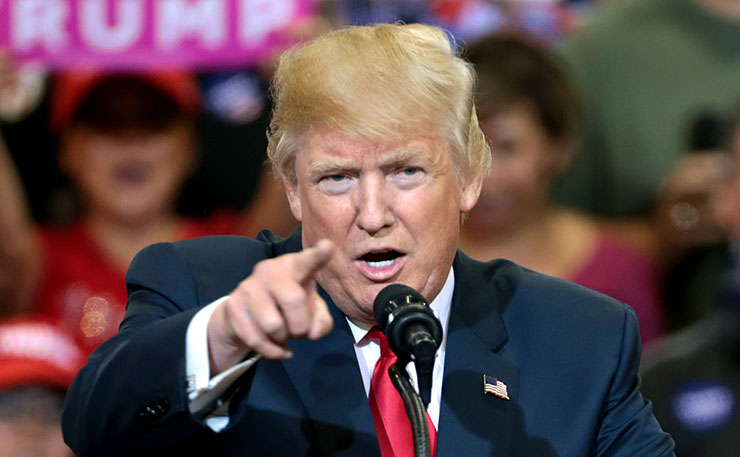
Trump of course is waging several wars against his own people. On my last day in Detroit I bumped into a group of Iraqi-American protestors outside the city’s immigration department offices. They were protesting against the threatened deportation of family members, some of whom committed offences back in the 1990s. These would-be deportees are parents, partners, brothers, sisters. Most have Green cards.
The protestors said Trump lied to them about the status of these people. Does he care? Not a chance. His ethnic cleansing program has so far resulted in the roundup of over 10,000 so-called illegal migrants. Protesters at rallies opposing such moves, have themselves been arrested.
I know this all sounds bewildering, but it’s a topsy-turvy time in the world’s richest nation. Neoliberalism permeates every aspect of government policy, increasingly so under Trump. The current mantra – yes, we’ve heard it before – is greed is good again, regulation sucks, and who the hell needs government services anyway? It’s dog eat dog.
Noam Chomsky pointed out in Requiem for an American Dream, the myth of personal enrichment turns everyone into a competitor, consumer and denizen rather than citizen. You’re either on the make, or on the take; it’s the world according to Milton Freidman, and its why Michael Katakis refers to America as the United States of Salesmen (USS): a nation obsessed with monetising anything and everything.
In the neo-Darwinian snake pit, only the most ruthless survive, or at least that’s the bull that has been touted. In Detroit, as in the rest of the USS (sic), the great arc of illusion, the hollow neoliberal promise, starts in the city’s business district where you’ll find freshly planted trees and flower beds, cafes and upmarket shopping malls.
Back in the ramshackle ‘hoods’, the community gardens offer some hope of good quality food to its residents, and the Freedom schools are providing a sound education for many kids. In some ways, there was little choice but to set up independent institutions: numerous schools in Detroit have been closed, defunded, or taken over by corporate entities – a scenario not dissimilar to what occurred in New Orleans in the wake of Hurricane Katrina.
Few here buy the American dream. Detroit’s African-American population know the cost of failed promises all too well. Industrial decline, corporate greed, years of governmental and institutional racism and neglect have taken their toll.
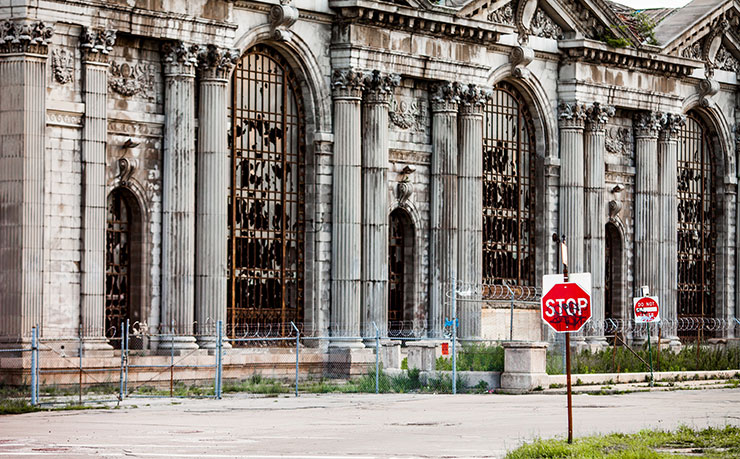
In the world of neoliberal capitalism, these are the unpeople, the forgotten, or what American writer, Marc Lamont Hill, refers to as the collective Nobody. This is how neoliberal capitalism treats those who supposedly haven’t made the cut or climbed the greasy pole. Rather than being provided with the care and protection which one might expect in a decent society, such people are now the subject of further assault and mistreatment.
For them, the road to renewal probably resides in their own hands, in resisting the coming funding cuts and over-policing, through the combined efforts of local communities.
Again, there’s little choice: they’re about to be further abandoned by those who see them as nobodies.
Donate To New Matilda
New Matilda is a small, independent media outlet. We survive through reader contributions, and never losing a lawsuit. If you got something from this article, giving something back helps us to continue speaking truth to power. Every little bit counts.

